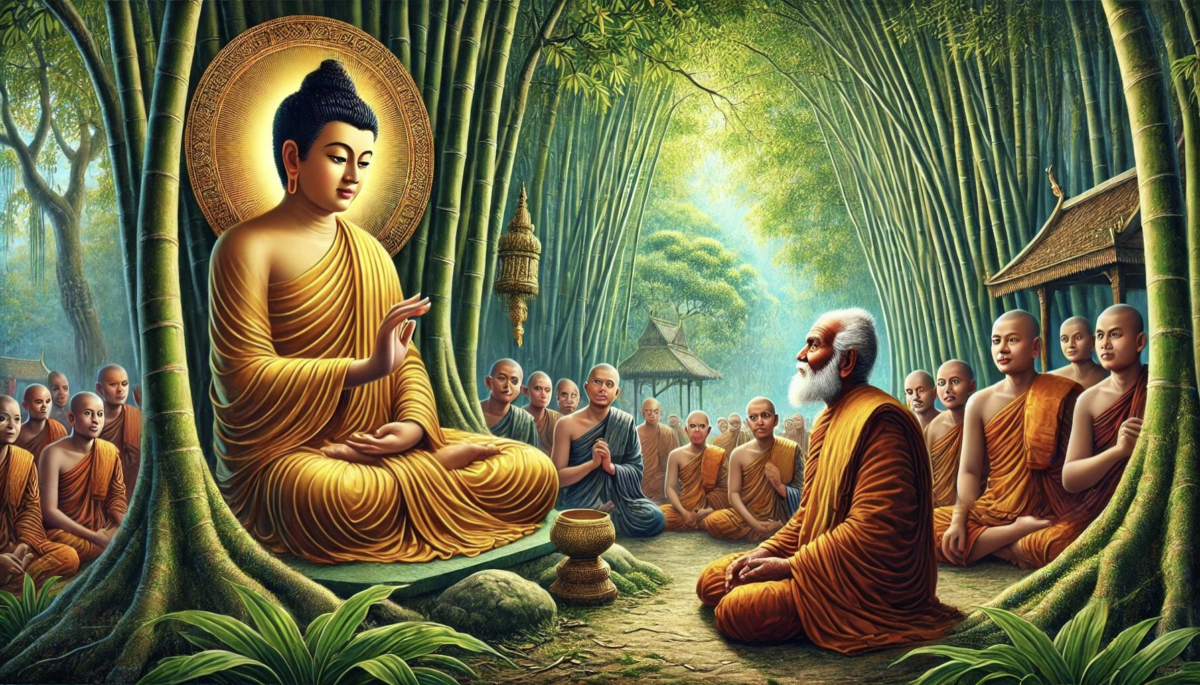
Date: 01/11/2025 01/12/2025
Location: Star River Meditation Center
Teacher: Yunquan Huang
Dharma Talk
Sariputra’s Liberation
One day, after Venerable Sariputra had been a monk for half a month under the Buddha, a heretic named “Long Claw” came to the bamboo grove of Kalanda in the northern part of Rajagriha, the capital of the Magadha Kingdom, to meet the Buddha. After performing the proper salutations and greetings, the heretic Long Claw said to the Buddha:
”Master Gotama! My view is: ‘I do not accept any view.'”
”Long Claw! Do you not even accept the view ‘I do not accept any view’?”
”Master Gotama! Since I say ‘I do not accept any view,’ of course, I do not accept such a view.”
”Long Claw! Since you do not accept even your own view, why do you speak it? If you do not express your own view, who will speak for you?
Long Claw! In fact, most people in this world are like you. Though they speak in such a way, in reality, they still hold on to certain views. Only a very small number of people can truly abandon all views.
Long Claw! Among ascetics and Brahmins, there are three types of attachment to views: First, ‘I accept all views.’ Second, ‘I do not accept any views.’ Third, ‘I accept some views, but not others.’ Those who hold the first type of view are often entangled by greed, hatred, delusion, and afflictions, and they tend to cling to attachments, unable to attain purity and detachment. Those who hold the second type of view are close to being free from greed, hatred, delusion, and affliction, and are near to purity without attachment or contamination.”
When the Buddha said this, Long Claw secretly rejoiced in his heart:
”Master Gotama agrees with my view! Master Gotama recommends my view!”
The Buddha continued:
”Those who hold the third type of view, when they accept some views, are in the same situation as those who hold the first type of view, and when they do not accept some views, they are similar to those who hold the second type of view.
Those who stubbornly cling to their own views, thinking that only their own views are the truth and that others’ views are wrong, will come into conflict with those who hold the other two types of views, leading to disputes and provocations that cause afflictions. A wise person, seeing the potential for such afflictions to arise, is able to let go of their attachment to their own views and will not be rigid in clinging to others’ views. In this way, all attachment to views can be stopped.
Long Claw! Our body is made up of the four great elements, formed from the substances of our parents, nourished by food. It is impermanent, subject to decay, disintegration, and destruction. It should be seen as impermanent, suffering, illness, tumors, thorns, disasters, torture, others, separation, emptiness, and not-self. If one can see this, one can abandon the craving, attachment, and bondage to the body.
Long Claw! A person experiences three types of feelings: pleasant, unpleasant, and neutral. When experiencing pleasant feelings, one cannot simultaneously experience the other two. When experiencing unpleasant or neutral feelings, one also cannot simultaneously experience the other two. Long Claw! These three types of feelings are impermanent, conditioned, and depend on causes and conditions. They are subject to decay and disappearance, ultimately dissolving. A disciple who has heard much of the Dharma can see this clearly and will not hold any illusions about pleasant, unpleasant, or neutral feelings. They will remain calm and rational in relation to them. Through this calmness and rationality, one can achieve liberation, gaining the wisdom of liberation: knowing that birth and death have ceased, that the practice of purity has been established, that all tasks have been completed, and that there is no longer any attachment to rebirth in the next life.
Long Claw! Such a liberated monk will no longer cling to anything or argue about anything. Although they still use worldly speech, they are not attached to worldly matters.”
At this moment, Venerable Sariputra, who was standing behind the Buddha holding a fan to cool him, upon hearing the Buddha’s teachings, thought to himself:
”Indeed, the World-Honored One, through his personal realization, has shown us the way to abandon views. The Blessed One, through his personal realization, has shown us the way to abandon attachment.”
Then, Venerable Sariputra began to contemplate and reflect on impermanence, birth and decay, renunciation, cessation, and abandonment, without allowing any afflictions to arise, and thus his mind was liberated.
Meanwhile, Long Claw, the heretic, renounced his worldly attachments and achieved the purity of the Dharma eye: he saw the Dharma, attained the Dharma, understood the Dharma, and entered the Dharma. He no longer needed others to resolve his doubts, and in the correct Dharma, his heart was no longer fearful. Then, the heretic Long Claw requested to follow the Buddha and become a monk to practice the teachings.

